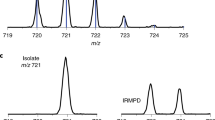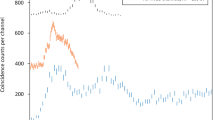Abstract
IN a recent letter to NATURE (vol. 117, p. 376, 1926), Dr. R. C. Johnson shows that the third positive carbon bands are related to those recently discovered by Cameron (Phil. Mag. (7) 1, p. 405, 1926), and that the final states of the Cameron bands are identical with the final states of the fourth positive carbon bands. As the fourth positive bands are known to belong to the neutral carbon monoxide molecule from Leifson's absorption experiments (Astro. Jour., 63, 73, 1926), Johnson concludes that Cameron's bands and the third positive bands also belong to the neutral carbon monoxide molecule. We have recently completed some experiments on the excitation of the carbon monoxide spectra by electron impacts which support the views of Johnson, and they enable us to extend the scheme of energy levels so that it includes all of the bands of carbon monoxide.
This is a preview of subscription content, access via your institution
Access options
Subscribe to this journal
Receive 51 print issues and online access
$199.00 per year
only $3.90 per issue
Buy this article
- Purchase on Springer Link
- Instant access to full article PDF
Prices may be subject to local taxes which are calculated during checkout
Similar content being viewed by others
Author information
Authors and Affiliations
Rights and permissions
About this article
Cite this article
DUFFENDACK, O., FOX, G. Energy Levels of the Carbon Monoxide Molecule. Nature 118, 12–13 (1926). https://doi.org/10.1038/118012a0
Issue Date:
DOI: https://doi.org/10.1038/118012a0
Comments
By submitting a comment you agree to abide by our Terms and Community Guidelines. If you find something abusive or that does not comply with our terms or guidelines please flag it as inappropriate.



